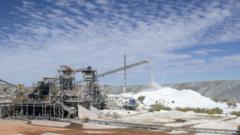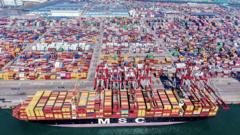The recent suspension of rare earth exports by China prompts Australia to consider strategies for independence in the mineral sector, seeking to counter China's control over refining.
**China Halts Rare Earth Exports: Will Australia Rise to the Challenge?**

**China Halts Rare Earth Exports: Will Australia Rise to the Challenge?**
As tensions rise over trade restrictions, Australia’s Prime Minister announces a multi-billion dollar investment in critical minerals.
China's recent decision to halt the export of key rare earth elements has raised alarm within the international community, particularly for countries heavily reliant on these resources, including the United States. Amid trade tensions, Australia's Prime Minister Anthony Albanese is stepping forward with a bold initiative: a proposed investment of A$1.2 billion (£580 million) into a strategic reserve for critical minerals, contingent upon the outcome of next month’s election. This move comes in response to China's export controls, which affect seven essential rare earth elements integral to advanced technology production like electric vehicles and military equipment.
Rare earths, a collection of 17 elements including samarium and terbium, play a crucial role in modern technology due to their rarity and the complexity involved in their extraction and refinement. While both Australia and China possess significant reserves, nearly 90% of the global rare earth refinement process occurs in China, placing them in a commanding position over supply chains. Concerns have escalated as Beijing's controls are perceived as retaliation against the tariffs imposed by the Trump administration on Chinese imports.
With around 75% of the US's rare earth imports sourced from China between 2019 and 2022, the dependency has led prominent figures like Elon Musk of Tesla to express worries regarding the impact of export restrictions on technological advancements, including the development of humanoid robots.
Albanese's proposal aims to establish a reserve that could support both domestic industries and international allies, particularly the US and EU. However, experts like Philip Kirchlechner caution that while the plan is a significant step, it doesn't fully address the underlying issue: China's dominance in the refining sector. Despite Australia’s considerable mining capabilities—producing 33% of the world’s lithium—most of its resources are exported without refining. Conversely, China refines more than half of the global lithium supply.
Recent efforts by Australia's government, such as investments in rare earth refining capabilities, reflect progress towards self-sufficiency. For instance, Arafura Rare Earths has secured A$840 million to develop a mine-refinery operation, and Australia has initiated its first processing plant, operated by Lynas Rare Earths. Nevertheless, projections indicate Australia could still rely on Chinese refinements until at least 2026.
As Australia navigates this geopolitical landscape, it faces continued pressure from both the US and China. With Chinese officials criticizing Washington's handling of international trade, Albanese's stance includes strengthening ties with allies while adamantly rejecting calls for collaboration with Beijing.
Analysts suggest that Albanese’s plan is more nuanced than previous initiatives, potentially allowing Australia to sell its resources in response to market fluctuations and exert pressure on prices controlled by China. However, the essential refining capabilities remain a pivotal weakness that Australia must address to support its ambitions of reducing reliance on Chinese dominance in the global market.
Rare earths, a collection of 17 elements including samarium and terbium, play a crucial role in modern technology due to their rarity and the complexity involved in their extraction and refinement. While both Australia and China possess significant reserves, nearly 90% of the global rare earth refinement process occurs in China, placing them in a commanding position over supply chains. Concerns have escalated as Beijing's controls are perceived as retaliation against the tariffs imposed by the Trump administration on Chinese imports.
With around 75% of the US's rare earth imports sourced from China between 2019 and 2022, the dependency has led prominent figures like Elon Musk of Tesla to express worries regarding the impact of export restrictions on technological advancements, including the development of humanoid robots.
Albanese's proposal aims to establish a reserve that could support both domestic industries and international allies, particularly the US and EU. However, experts like Philip Kirchlechner caution that while the plan is a significant step, it doesn't fully address the underlying issue: China's dominance in the refining sector. Despite Australia’s considerable mining capabilities—producing 33% of the world’s lithium—most of its resources are exported without refining. Conversely, China refines more than half of the global lithium supply.
Recent efforts by Australia's government, such as investments in rare earth refining capabilities, reflect progress towards self-sufficiency. For instance, Arafura Rare Earths has secured A$840 million to develop a mine-refinery operation, and Australia has initiated its first processing plant, operated by Lynas Rare Earths. Nevertheless, projections indicate Australia could still rely on Chinese refinements until at least 2026.
As Australia navigates this geopolitical landscape, it faces continued pressure from both the US and China. With Chinese officials criticizing Washington's handling of international trade, Albanese's stance includes strengthening ties with allies while adamantly rejecting calls for collaboration with Beijing.
Analysts suggest that Albanese’s plan is more nuanced than previous initiatives, potentially allowing Australia to sell its resources in response to market fluctuations and exert pressure on prices controlled by China. However, the essential refining capabilities remain a pivotal weakness that Australia must address to support its ambitions of reducing reliance on Chinese dominance in the global market.





















